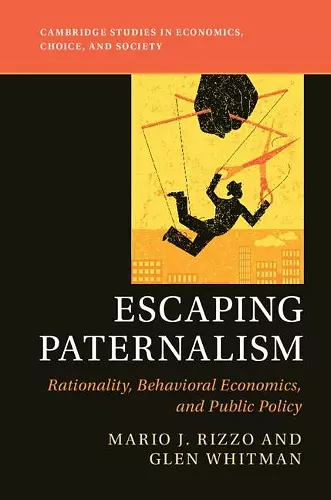Escaping Paternalism
Rationality, Behavioral Economics, and Public Policy
Glen Whitman author Mario J Rizzo author
Format:Paperback
Publisher:Cambridge University Press
Published:5th Dec '19
Currently unavailable, and unfortunately no date known when it will be back
This paperback is available in another edition too:
- Hardback£125.00(9781107016941)

A powerful critique of nudge theory and the paternalist policies of behavioral economics, and an argument for a more inclusive form of rationality.
This book carefully dissects the claims of nudge theory and other forms of paternalism based on behavioral economics. The authors reveal how paternalist normative standards are unjustified and why paternalist policymaking is unlikely to produce desirable results, arguing instead for a more inclusive theory of rationality in economic policymaking.The burgeoning field of behavioral economics has produced a new set of justifications for paternalism. This book challenges behavioral paternalism on multiple levels, from the abstract and conceptual to the pragmatic and applied. Behavioral paternalism relies on a needlessly restrictive definition of rational behavior. It neglects nonstandard preferences, experimentation, and self-discovery. It relies on behavioral research that is often incomplete and unreliable. It demands a level of knowledge from policymakers that they cannot reasonably obtain. It assumes a political process largely immune to the effects of ignorance, irrationality, and the influence of special interests and moralists. Overall, behavioral paternalism underestimates the capacity of people to solve their own problems, while overestimating the ability of experts and policymakers to design beneficial interventions. The authors argue instead for a more inclusive theory of rationality in economic policymaking.
'Taking issue with the narrow norms of rationality in much of behavioral economics, this remarkable book argues in favor of an inclusive concept of rationality and is one of the first to cover the full range of relevant empirical evidence from psychology. Escaping Paternalism promotes a serious attempt to understand why people do what they do.' Gerd Gigerenzer, Director of the Harding Center for Risk Literacy, Max-Planck-Institut für Bildungsforschung, Berlin
'Mario J. Rizzo and Glen Whitman have written an incisive yet accessible critique of the dominant strain of behavioral economics associated with Daniel Kahneman, Richard Thaler and Cass Sunstein. Rizzo and Whitman are wise enough to know that human beings, with quirks and practices, are 'people, not puppets'. Yet they show how classical liberal principles of governance do far better in organizing social arrangements than the various forms of soft paternalism now in vogue with so many behavioral economists.' Richard Epstein, Laurence A. Tisch Professor of Law, New York University
'Mario J. Rizzo and Glen Whitman present a powerful and well-documented critique of behavioural economists' justifications of paternalism. They argue convincingly that these justifications illegitimately presuppose that rational-choice theory is a normative standard. Inspired by the psychology of Gerd Gigerenzer, they offer a more pragmatic and 'ecological' understanding of human rationality.' Robert Sugden, University of East Anglia
ISBN: 9781108760003
Dimensions: 228mm x 157mm x 27mm
Weight: 730g
506 pages